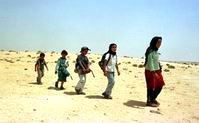 AG Concurs with Adalah that Distribution of Jewish National Fund (JNF) Lands Only to Jews Constitutes Discrimination AG Concurs with Adalah that Distribution of Jewish National Fund (JNF) Lands Only to Jews Constitutes Discrimination
However, Adalah Opposes Attorney General's Suggested Compensatory Transfer of State Land to JNF |
 |
 In a Precedent-Setting Decision, Supreme Court (SCt) Rules that Affirmative Action Policies in Education Must be Applied for the Arab Bedouin but Does Not Grant Immediate Remedy In a Precedent-Setting Decision, Supreme Court (SCt) Rules that Affirmative Action Policies in Education Must be Applied for the Arab Bedouin but Does Not Grant Immediate Remedy |
 |
 Beer el-Sabe Magistrate Court Acquits Four Arab Citizens Charged with Sedition and Supporting a Terrorist Organization during Participation in 2002 Land Day Demonstrations Beer el-Sabe Magistrate Court Acquits Four Arab Citizens Charged with Sedition and Supporting a Terrorist Organization during Participation in 2002 Land Day Demonstrations |
|
|
|
|
|
Featured Case |
|
|
 Beer el-Sabe Municipality to SCt: Big Mosque Should not be Opened for Muslim Worshippers for Security Reasons – It Should be Used as a Museum Beer el-Sabe Municipality to SCt: Big Mosque Should not be Opened for Muslim Worshippers for Security Reasons – It Should be Used as a Museum
SCt Criticizes this Position and Proposes Temporary Use of Big Mosque as Muslim Cultural Center
Eva Mousa, Adalah Media Coordinator |
|
|
|
Articles on the Constitution (Part II) |
|
|
|
Constitution or Prostitution? |
|
Prof. Baruch Kimmerling, Department of Sociology and Anthropology, Hebrew University |
 |
|
A Constitution for Israel: With Whose Consent and at Whose Expense? |
|
Dr. Aeyal Gross, Senior Lecturer in Constitutional Law and International Law, Tel Aviv University |
 |
|
The Jewish Institute for Ethnic Democracy: A Response to the Israel Democracy Institute (IDI) |
|
Prof. Nadim Rouhana, Department of Sociology and Anthropology, Tel Aviv University and Director of Mada |
|
|
|
Land, Planning and Justice |
|
SCt Overturns District Court Decision: There is No Duty to Consult with Local Villages / Settlements Committees Before Issuing Home Demolition Orders |
|
|
|
Criminal Justice |
|
Adalah to SCt: AG Must Indict Police Officers Who Shot and Killed 17-Year-Old Mahmoud Sadi from Led (Lod) |
 |
|
As a Result of Adalah’s Complaint, State Prosecutor Indicts Border Police Officer who Shot Salah Amer in Kufr Qassem |
|
|
|
Education Rights |
|
AG to SCt: General Security Service Position in Education Ministry is Legal - SCt to Hear Petition on 8 May 2005 |
|
|
|
|
|
|
|
|
|
|
|
Opening Remarks |
|
Despite the State Comptroller's unambiguous conclusion in 2000 that, “Even after the Landau Commission's report, the phenomenon of lying by GSS interrogators before legal bodies has not been uprooted,” the Supreme Court (SCt) has not studied the ensuing lessons. For example, the plea bargain in the Islamic Movement case uncovered an entirely different normative reality from that which the GSS brought before the SCt, resulting in the SCt's extension of the accuseds' detention three times. In many cases - relying on GSS secret evidence - the SCt dismissed petitions against orders prohibiting detainees from meeting attorneys “for security reasons.” After one or two days, however, the detainees are released without charge. We now know the indictment against Tali Fahima contains the core of the secret evidence relied upon by the SCt to uphold her administrative detention; this supports the argument that her criminal detention is unjustified. The defense in the Islamic Movement case knew that the prosecutor’s evidence was unsound, but agreed to plea bargain, fearing that the SCt’s decisions would influence the trial court, and continuing the trial would lengthen their detention. These rational reasons lead to the conclusion that - despite their plea - they did not commit any crime. |
|
|
|
Commentary |
|
|
|
|
|
Fellowship |
|
|
|